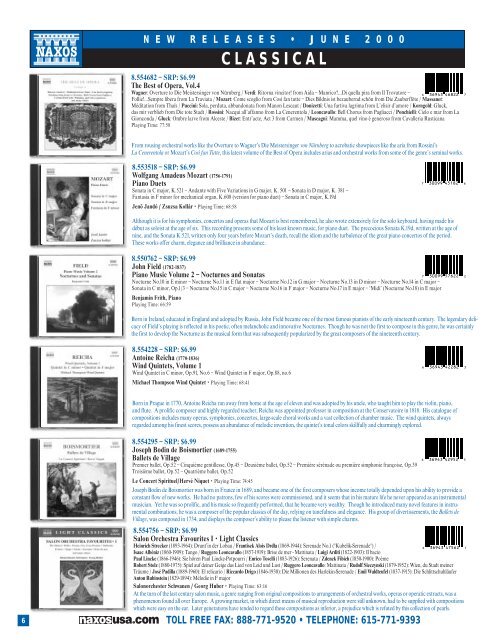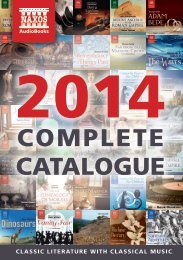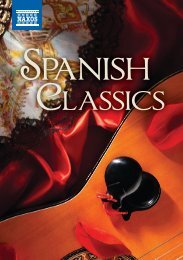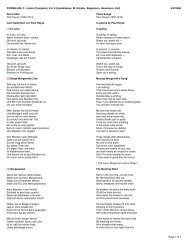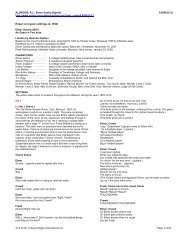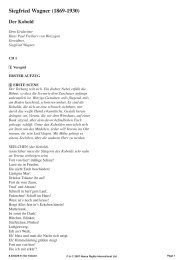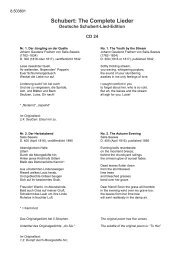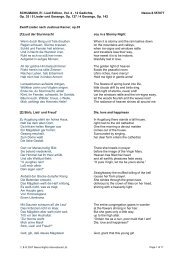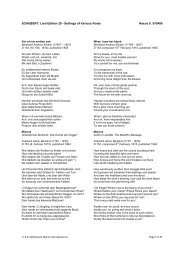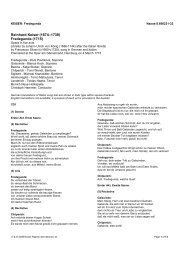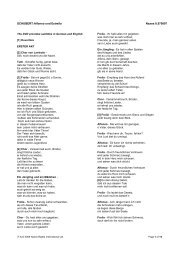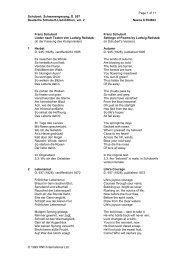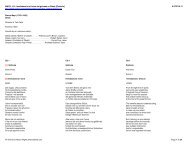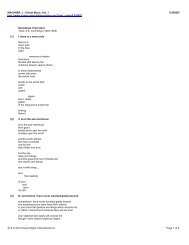Naxos of America to Distribute Ivory Classics.
Naxos of America to Distribute Ivory Classics.
Naxos of America to Distribute Ivory Classics.
Create successful ePaper yourself
Turn your PDF publications into a flip-book with our unique Google optimized e-Paper software.
N E W R E L E A S E S • J U N E 2 0 0 0<br />
CLASSICAL<br />
8.554682 – SRP: $6.99<br />
The Best <strong>of</strong> Opera, Vol.4<br />
Wagner: Overture <strong>to</strong> Die Meistersinger von Nürnberg / Verdi: Ri<strong>to</strong>rna vinci<strong>to</strong>r! from Aida – Manrico?…Di quella pira from Il Trova<strong>to</strong>re – 36943 46822<br />
Follie!…Sempre libera from La Traviata / Mozart: Come scoglio from Cosí fan tutte – Dies Bildnis ist bezaubernd schön from Die Zauberflöte / Massanet:<br />
Méditation from Thaïs / Puccini: Sola, perduta, abbandonata from Manon Lescaut / Donizetti: Una furtiva lagrima from L’elisir d’amore / Korngold: Gluck,<br />
das mir verblieb from Die <strong>to</strong>te Stadt / Rossini: Nacqui all’affanno from La Ceneren<strong>to</strong>la / Leoncavallo: Bell Chorus from Pagliacci / Ponchielli: Cielo e mar from La<br />
Gionconda / Gluck: Ombre larve from Alceste / Bizet: Entr’acte, Act 3 from Carmen / Mascagni: Mamma, quel vino é generoso from Cavalleria Rusticana<br />
Playing Time: 77:58<br />
From rousing orchestral works like the Overture <strong>to</strong> Wagner’s Die Meistersinger von Nürnberg <strong>to</strong> acrobatic showpieces like the aria from Rossini’s<br />
La Ceneren<strong>to</strong>la or Mozart’s Così fan Tutte, this latest volume <strong>of</strong> the Best <strong>of</strong> Opera includes arias and orchestral works from some <strong>of</strong> the genre’s seminal works.<br />
8.553518 – SRP: $6.99<br />
Wolfgang Amadeus Mozart (1756-1791)<br />
Piano Duets<br />
Sonata in C major, K.521 – Andante with Five Variations in G major, K. 501 – Sonata in D major, K. 381 –<br />
Fantasia in F minor for mechanical organ, K.608 (version for piano duet) – Sonata in C major, K.19d<br />
Jenö Jandó / Zsuzsa Kollár • Playing Time: 68:58<br />
7 30099 45182 6<br />
Although it is for his symphonies, concer<strong>to</strong>s and operas that Mozart is best remembered, he also wrote extensively for the solo keyboard, having made his<br />
début as soloist at the age <strong>of</strong> six. This recording presents some <strong>of</strong> his least known music, for piano duet. The precocious Sonata K.19d, written at the age <strong>of</strong><br />
nine, and the Sonata K.521, written only four years before Mozart’s death, recall the idiom and the turbulence <strong>of</strong> the great piano concer<strong>to</strong>s <strong>of</strong> the period.<br />
These works <strong>of</strong>fer charm, elegance and brilliance in abundance.<br />
8.550762 – SRP: $6.99<br />
John Field (1782-1837)<br />
Piano Music Volume 2 – Nocturnes and Sonatas<br />
Nocturne No.10 in E minor – Nocturne No.11 in E flat major – Nocturne No.12 in G major – Nocturne No.13 in D minor – Nocturne No.14 in C major –<br />
Sonata in C minor, Op.1/3 – Nocturne No.15 in C major – Nocturne No.16 in F major – Nocturne No.17 in E major – ‘Midi’ (Nocturne No.18) in E major<br />
Benjamin Frith, Piano<br />
Playing Time: 66:59<br />
7 30099 57622 2<br />
Born in Ireland, educated in England and adopted by Russia, John Field became one <strong>of</strong> the most famous pianists <strong>of</strong> the early nineteenth century. The legendary delicacy<br />
<strong>of</strong> Field’s playing is reflected in his poetic, <strong>of</strong>ten melancholic and innovative Nocturnes. Though he was not the first <strong>to</strong> compose in this genre, he was certainly<br />
the first <strong>to</strong> develop the Nocturne as the musical form that was subsequently popularized by the great composers <strong>of</strong> the nineteenth century.<br />
8.554228 – SRP: $6.99<br />
An<strong>to</strong>ine Reicha (1770-1836)<br />
Wind Quintets, Volume 1<br />
Wind Quintet in C minor, Op.91, No.6 – Wind Quintet in F major, Op.88, no.6<br />
Michael Thompson Wind Quintet • Playing Time: 68:41<br />
6 36943 42282 3<br />
Born in Prague in 1770, An<strong>to</strong>ine Reicha ran away from home at the age <strong>of</strong> eleven and was adopted by his uncle, who taught him <strong>to</strong> play the violin, piano,<br />
and flute. A prolific composer and highly regarded teacher, Reicha was appointed pr<strong>of</strong>essor in composition at the Conserva<strong>to</strong>ire in 1818. His catalogue <strong>of</strong><br />
compositions includes many operas, symphonies, concer<strong>to</strong>s, large-scale choral works and a vast collection <strong>of</strong> chamber music. The wind quintets, always<br />
regarded among his finest scores, possess an abundance <strong>of</strong> melodic invention, the quintet’s <strong>to</strong>nal colors skillfully and charmingly explored.<br />
8.554295 – SRP: $6.99<br />
Joseph Bodin de Boismortier (1689-1755)<br />
Ballets de Village<br />
Premier ballet, Op.52 – Cinquième gentillesse, Op.45 – Deuxième ballet, Op.52 – Première sérénade ou première simphonie françoise, Op.39<br />
Troisième ballet, Op.52 – Quatrième ballet, Op.52<br />
6 7<br />
6 36943 42952 5<br />
Le Concert Spirituel/Hervé Niquet • Playing Time: 74:45<br />
Joseph Bodin de Boismortier was born in France in 1689, and became one <strong>of</strong> the first composers whose income <strong>to</strong>tally depended upon his ability <strong>to</strong> provide a<br />
constant flow <strong>of</strong> new works. He had no patrons, few <strong>of</strong> his scores were commissioned, and it seems that in his mature life he never appeared as an instrumental<br />
musician. Yet he was so prolific, and his music so frequently performed, that he became very wealthy. Though he introduced many novel features in instrumental<br />
combinations, he was a composer <strong>of</strong> the popular classics <strong>of</strong> the day, relying on tunefulness and elegance. His group <strong>of</strong> divertissements, the Ballets de<br />
Village, was composed in 1734, and displays the composer’s ability <strong>to</strong> please the listener with simple charms.<br />
8.554756 – SRP: $6.99<br />
Salon Orchestra Favourites I • Light <strong>Classics</strong><br />
Heinrich Strecker (1893-1964): Drunt’in der Lobau / Frantisek Alois Drdla (1869-1944): Serenade No.1 ("Kubelík-Serenade") /<br />
Isaac Albéniz (1860-1909): Tango / Ruggero Leoncavallo (1857-1919): Brise de mer - Mattinata / Luigi Arditi (1822-1903): Il bacio<br />
Paul Lincke (1866-1946): Sie hören Paul Lincke-Potpourri / Enrico Toselli (1883-1926): Serenata / Zdenek Fibich (1850-1900): Poème<br />
Robert S<strong>to</strong>lz (1880-1975): Spiel auf deiner Geige das Lied von Leid und Lust / Ruggero Leoncavallo: Mattinata / Rudolf Sieczynski (1879-1952): Wien, du Stadt meiner<br />
Träume / José Padilla (1889-1960): El relicario / Riccardo Drigo (1846-1930): Die Millionen des Harlekin-Serenade / Emil Waldteufel (1837-1915): Die Schlittschuhläufer<br />
An<strong>to</strong>n Rubinstein (1829-1894): Mélodie in F major<br />
Salonorchester Schwanen / Georg Huber • Playing Time: 63:16<br />
At the turn <strong>of</strong> the last century salon music, a genre ranging from original compositions <strong>to</strong> arrangements <strong>of</strong> orchestral works, operas or operatic extracts, was a<br />
6 36943 47562<br />
1<br />
phenomenon found all over Europe. A growing market, in which direct means <strong>of</strong> musical reproduction were still unknown, had <strong>to</strong> be supplied with compositions<br />
which were easy on the ear. Later generations have tended <strong>to</strong> regard these compositions as inferior, a prejudice which is refuted by this collection <strong>of</strong> pearls.<br />
6 TOLL FREE FAX: 888-771-9520 • TELEPHONE: 615-771-9393


